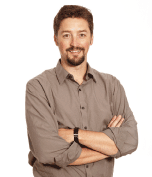

Chris Smeenk: Einstein’s Universe (Classes Without Quizzes)
10 November 2015, 2:00 pm - 3:00 pm EST
This lecture is part of the free public lecture series, Classes Without Quizzes, co-sponsored by Western Alumni and the London Public Library.
ABSTRACT
Einstein developed his theory of general relativity 100 years ago. Join philosophy professor Chris Smeenk for an exploration of Einstein’s distinctively philosophical approach to physics, and how his ideas have shaped our understanding of the universe. He will explain what it means to say that space and time are curved, and that the universe might have a beginning, as well as describing Einstein’s life and context.
SPEAKER PROFILE
I began my undergraduate years intending to study physics. I was drawn to physics partly because physicists had obviously been so successful in discovering a great deal about nature, but also because modern physics is so strikingly creative and counterintuitive. In my freshmen year of college, I studied philosophy for the first time as part of an intensive humanities program. The first term of that course (taught by Ruth Marcus) was responsible for kindling my interest in philosophy. I discovered that it was possible to pursue both physics and philosophy, as a combined major. Thinking about these topics was exciting and rewarding enough that I decided to go on to graduate study, at Pittsburgh’s Department of History and Philosophy of Science.
HPS at Pitt was an incredibly enriching experience. HPS departments tend to be more closely aligned with either history of science or philosophy of science. A colleague in graduate school once memorably described Pitt’s department as neither “big H” (emphasis on history) nor “big P” (emphasis on philosophy), but instead “big S” (emphasis on science). Like most of my peers in graduate school, I developed the skills to do “big S”-style work by continuing to study physics. My dissertation is a historical and philosophical study of the development of early universe cosmology. This has continued to be a major focus of my research, but I also have worked on topics ranging from Newton’s work to the nature of time in Einstein’s theory of gravity. The common thread tying together all of this work is an interest in both what specific physical theories say about the world, and how we should justify and evaluate these theories.
After finishing my dissertation, I held a postdoc at the Dibner Institute (affiliated with MIT) for one year. I was then an assistant professor of philosophy for four years at UCLA before accepting a position at Western in 2007.
Read more about Chris Smeenk.
This event is co-sponsored with the London Public Library and is part of Western’s free community lecture series, Classes without Quizzes.


